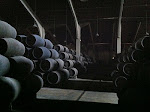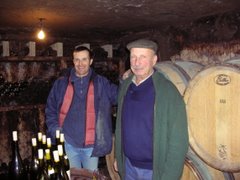A Conversation with Neal Rosenthal - Part I
Almost a year ago now, I interviewed Becky and Peter Wasserman. It was a great experience - I learned a tremendous amount and I feel like I helped to share a tiny bit of an interesting story. Recently I had a similar opportunity. I was fortunate enough to spend an afternoon at Mad Rose Ranch, the domain of wine importer Neal Rosenthal. He kindly opened his home to me and we walked around, ate, drank, and talked.
I did my very best to record everything faithfully. I did not use a tape recorder, instead taking careful notes. What follows is a paraphrasing of his comments during our conversation (and sometimes a paraphrasing of myself, for the sake of condensation).
Before I get into our talk, though, I want to share a few preliminaries. Neal Rosenthal has worked in the wine business for 34 years. He shared the story of those 34 years in his book, Reflections of a Wine Merchant. He has been interviewed before too - many times.
My point is, although I'm very excited to share with you the things I learned, I'm not trying to suggest that I can condense 34 years of bold work into three blog posts. So take this as what it is - I spent a few hours talking with the guy in his home. We got along really well, and I'm going to try to paint a picture of him as I understand him to be.




BG: What did you do before you were in the wine business?
NR: When I was in college I thought I'd be in government. I was a politically aware guy - I come from a classic eastern European Jewish family and I had socialist ideas. I majored in history and I thought I'd be a history professor. Then, for reasons that I still don't fully understand, I went to Columbia University for law school. I did exceptionally well - I was on the law review. After school I worked at a big corporate firm doing corporate international tax law.
BG: Why did you leave that work?
NR: The theory was challenging but the practice wasn't so interesting. I didn't have the feeling that I was serving a bigger purpose. I worked for 7 years in that job, got married, had a daughter. But I was miserable and in the end I spent more time daydreaming than doing my work. I knew I wouldn't make partner, and one day they told me "Neal, you're not going to make partner," so I decided it was time to leave.
BG: And what happened?
NR: I left my job, got divorced around the same time, and wanted to write fiction. But I had to pay alimony and I had to find a way to make a couple of bucks because I knew that you couldn't make money writing fiction.
BG: So you got into the wine business to make money.
NR: Not at all, I never got into this to make money. I never could have imagined this, what I have now. My father had a pharmacy, and in those days a pharmacy had a luncheonette, a long counter and you could eat lunch there or have a soda at the fountain. At some point my father sold the pharmacy and kept the luncheonette, which he then converted into a liquor store because he thought it would be easier to make money. I bought it from him and tried to make a couple of bucks while making it as a writer. We never drank wine at home, but the upper east side was a high class neighborhood and we had to sell wine.
BG: How long was it before you fell in love with wine?
NR: Not long at all. Working retail, everyone wants to sell to you. You see lots of wine, you make choices, you see all of the crap that's out there, you see some of the good stuff. This was when wine was much cheaper than it is now and I could drink some of the greatest wines in the world.
BG: And so how did you go from selling wine out of an old pharmacy on the upper east side to becoming an importer?
NR: I'd read these wonderful things that Frank Schoonmaker wrote about an appellation and its wines, I'd find the wines, and they didn't move me. Have you read Frank Schoonmaker?
BG: No.
NR: You really should read him. AJ Liebling too. These guys weren't describing how wines taste. They wrote about their travels, and what they were doing and thinking about when they drank a wine, who they drank it with and why it meant something to them. You really ought to read these guys.
BG: Okay (makes a note in little book).
NR: Anyway, the wines I tasted in NYC didn't move me, so I went to Europe to find the wines that moved those guys. In January of 1980 I went to Piedmonte and I drank the wines of Luigi Ferrando and DeForville, and I brought the wines back to America. Now 34 years later I am still working with both of these families, and I am very proud of our long and loyal relationship.
BG: That is a long working relationship.
NR: It is. You don't see a lot of this anymore. There are a couple of other folks, like Kermit Lynch and Bob Chadderdon, who are old school like this, who started the way I did. They have a real identity, they know who they are, they're not trying to be something to everyone, they buy the wines they want to put their names on, the wines they like to drink.
BG: So, what do you do that works, how do you run your business?
NR: I buy the wine, ship it, store it, and sell it. That's what I do. It's a capital intensive business, but it's the right way to do business. You have to pay your bills on time. You have to...are you Jewish?
BG: And how!
NR: You have to be a mensch.
BG: So what's the other model? How are other people doing it?
NR: They ask a producer to hold 50 cases for them, to reserve the wine. They don't commit to buying it. They try to sell the wine, and once it's sold they pay for it. That's not what I do. I buy wine up front, and then I bring it here and store it and sell it. I have a big warehouse in Queens where I store wine. I pay to store wine while I sell it, and if something doesn't sell, so what? If I have some great Burgundies that wait three or four years in the warehouse before I sell them, so what? They get better.
BG: But you're taking a risk buying the wine up front, right? You have to be very careful in picking which wines you buy.
NR: Yes, of course. I cannot have three thousand cases of cheap white wine hanging around, that's a big loss. I have to buy carefully. When you put your hand in your pocket and spend that money, you have to be disciplined, to know what you're buying.
BG: Come to think of it, you don't really have many cheap whites in your portfolio...
NR: You have to understand, I've never had a contract in my life - ever. It's all handshakes. I started by buying 25 cases of Sancerre from Lucien Crochet - that's 300 bottles of wine. I took the wine and 90 days later, I paid him. That's the way I do business, and I have to know what I'm buying.
To be continued...







4 comments:
great interview and really informative. thanks BG. He seems to reflect more the "business end" of the traditional wine movement...more willing, as you've brought out in your interview, to talk about the financial side of it. That came out, too, in Mondovino. While Lynch reflects his love of Provence (from Richard Olney) and Dressner the phenomenon of "natural wine," Rosenthal seems more capable or willing to talk about the issue of economic viability of traditional and less commercial Continental wines--something we tend to forget: there are economic risks involved.
Just wanted to say thanks for the post. Enjoyed it very much and imagine it was a very memorable day for you...
Anon - i understand what you're saying based on the first post, but he was actually most passionate about other things - he simply was quite lucid and thoughtful about the business side of things. the next few posts i hope will describe the more passionate side of the guy. thanks for your comments.
thanks Tom.
PS...my wife designed his logo and his import label. They still look good.
Post a Comment